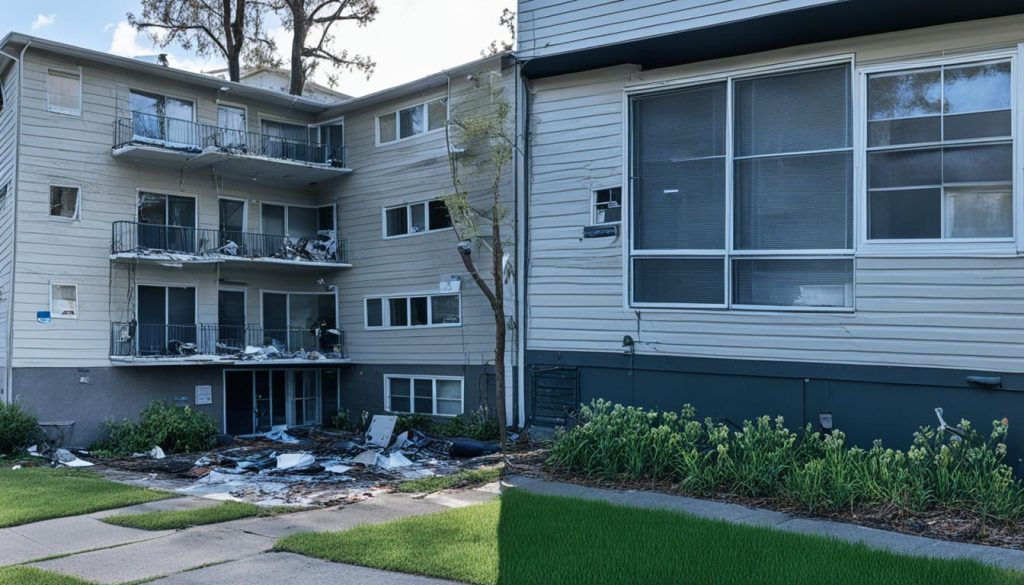Renters’ insurance is an invaluable asset for anyone leasing a living space, providing comprehensive coverage for your personal belongings, liability protection, and additional living expenses in case of emergencies. One of the primary reasons to consider renters insurance is its affordability, with premiums typically ranging from $15 to $30 per month. This coverage protects your personal property, including furniture, electronics, clothing, and other valuable possessions, against a wide range of perils such as fire, natural disasters, theft, and vandalism. Renters insurance also offers liability coverage, which can help protect you from legal expenses and medical bills if someone is injured in your rental property. Additionally, if your home becomes uninhabitable due to a covered incident, your renters insurance policy may provide coverage for temporary living expenses, ensuring you can maintain a sense of normalcy during challenging times.
Key Takeaways
- Renters’ insurance provides comprehensive coverage for personal belongings, liability, and additional living expenses.
- Renters insurance is an affordable option, with premiums typically ranging from $15 to $30 per month.
- The policy protects your personal property against a variety of perils, including fire, natural disasters, theft, and vandalism.
- Renters insurance offers liability coverage to protect you from legal and medical expenses if someone is injured in your rental property.
- If your home becomes uninhabitable, your renters insurance policy may cover temporary living expenses.
Understanding Renters’ Insurance
Renters’ insurance is a type of insurance policy designed to protect the personal belongings and liability of individuals who are renting a property, such as an apartment or a house. The primary purpose of renters’ insurance is to safeguard your personal possessions and provide liability coverage in case of unexpected events.
Definition and Purpose
A standard renters’ insurance policy typically covers personal property, including clothing, electronics, furniture, and other valuables, against a wide range of perils such as fire, theft, vandalism, and accidental water damage. Additionally, renters’ insurance provides liability protection, which can help cover legal expenses and medical bills if someone is injured in your rental property. Some policies may also include coverage for additional living expenses if your home becomes uninhabitable due to a covered incident.
What Renters’ Insurance Covers
Renters’ insurance is designed to provide comprehensive coverage for your personal belongings and liability. This includes protection for your personal property, such as clothing, electronics, furniture, and other valuables, against a variety of perils. Additionally, the liability protection offered by renters’ insurance can cover legal expenses and medical bills if someone is injured in your rental property. Some policies may also include coverage for additional living expenses, ensuring you can maintain a sense of normalcy if your home becomes uninhabitable due to a covered event.
Affordable Protection for Your Belongings
One of the main benefits of renters’ insurance is its affordability. Unlike other insurance policies, such as homeowners insurance, renters’ insurance is generally budget-friendly, with premiums often ranging from $15 to $30 per month. This makes it a smart investment for renters who want to protect their personal belongings without breaking the bank.
Even if you don’t own a lot of valuable items, the cumulative value of your personal belongings, including your clothing, electronics, furniture, and other possessions, can quickly add up. Renters’ insurance policies often provide replacement cost coverage, which means that if your belongings are stolen or damaged, the insurance company will reimburse you for the full cost of replacing them with new items, rather than just the depreciated value.
| Renters’ Insurance Premiums | Replacement Cost Coverage |
|---|---|
| $15 to $30 per month | Reimburses the full cost of replacing damaged or stolen items |
This comprehensive coverage makes renters’ insurance a cost-effective way to protect your personal possessions, ensuring that you’re not left with a substantial financial burden in the event of unexpected circumstances.

Safeguarding Against Unexpected Events
Renters’ insurance is designed to safeguard your personal belongings against a wide range of unexpected events, including protection against fire and natural disasters, as well as theft and vandalism. This comprehensive coverage can give you peace of mind, knowing that your possessions are protected even in the face of unpredictable circumstances.
Fire and Natural Disasters
If your rental property is damaged by a fire or a natural disaster, such as a storm or flood, your renters’ insurance policy can help cover the cost of replacing your personal items. This coverage can be invaluable in restoring your belongings and getting your life back on track after unexpected events that can leave you vulnerable.
Theft and Vandalism
Renters’ insurance also provides protection against theft and vandalism, which can be a significant concern for those living in rental properties. If your belongings are stolen or damaged due to malicious acts, your policy can offer financial assistance to help you replace the affected items. This coverage can give you the peace of mind to know that your possessions are safeguarded, even when faced with unpredictable and unwanted incidents.
Renters’ Insurance Benefits
Renters’ insurance offers a range of valuable benefits to protect you and your personal belongings. From safeguarding your personal property to providing liability protection and coverage for additional living expenses, this comprehensive coverage can give you peace of mind and financial security.
Personal Property Coverage
The personal property coverage component of a renters’ insurance policy can help replace or repair your belongings if they are damaged, destroyed, or stolen, regardless of whether the incident occurs in your rental property or elsewhere. This coverage for personal belongings can be especially important if you own valuable items such as electronics, furniture, or jewelry.
Liability Protection
Renters’ insurance also provides liability protection, which can cover legal expenses and medical bills if someone is injured on your rental property. This coverage can be particularly valuable if you entertain guests or have visitors to your home, as it can help protect you from potential financial liabilities.
Additional Living Expenses
Furthermore, if your rental home becomes uninhabitable due to a covered event, your renters’ insurance policy may provide coverage for additional living expenses, such as the cost of temporary housing and meals. This can help ensure that you can maintain a sense of normalcy during the disruption, without having to bear the full financial burden of finding temporary living accommodations.

Landlord Requirements and Benefits
In an increasing number of rental agreements, landlords are making renters’ insurance a mandatory requirement for their tenants. This serves as a form of protection not only for the renters but also for the property owners. By ensuring that tenants have insurance coverage, landlords can mitigate the risk of potential legal disputes and financial losses in the event of damages to the rental property. Renters’ insurance can provide an additional layer of protection for landlords, as it can help cover the cost of repairing or replacing any damages caused by the tenant’s personal belongings or actions. This requirement also benefits renters by ensuring that they have the necessary coverage in place to safeguard their possessions and liability.
The benefits of renters’ insurance for landlords are clear. By requiring their tenants to have this coverage, landlords can significantly reduce the financial burden and legal risks associated with property damage or liability claims. This property owner protection can give landlords peace of mind, knowing that their investment is safeguarded against unexpected events.
Overall, the landlord requirements for renters’ insurance demonstrate a mutually beneficial arrangement. Landlords can protect their property, while renters can enjoy the security of having their personal belongings and liability covered. This collaborative approach helps create a more stable and secure rental environment for all parties involved.
Choosing the Right Coverage
When selecting renters’ insurance, it’s crucial to carefully assess your specific coverage needs and compare policy options to find the best fit. Begin by taking an inventory of your personal belongings and estimating their total value. This will help you determine the appropriate coverage limits for your policy. Additionally, consider your liability exposure and any additional living expenses you may need to be covered, such as temporary housing and meals if your rental home becomes uninhabitable.
Assessing Your Needs
Carefully evaluating your personal belongings and potential risks is the first step in choosing the right renters’ insurance coverage. Take the time to create a comprehensive list of your valuables, including furniture, electronics, clothing, and any other items of significance. Estimating the total value of these possessions will guide you in selecting the appropriate coverage limits to ensure your belongings are adequately protected.
Comparing Policy Options
When comparing renters’ insurance policy options, pay close attention to factors such as the deductible, coverage limits, and whether the policy offers replacement cost coverage or actual cash value reimbursement. Replacement cost coverage ensures that if your belongings are stolen or damaged, the insurance company will reimburse you for the full cost of replacing them with new items, rather than just the depreciated value.
By carefully evaluating your needs and exploring different policy options, you can find a renters’ insurance plan that provides comprehensive protection at an affordable premium. This will give you the peace of mind of knowing that your personal belongings, liability, and additional living expenses are well-covered in the event of unexpected circumstances.

The Claim Process
If you ever need to file a renters’ insurance claim, it’s important to understand the process and be prepared with the necessary documentation. The renters’ insurance claim process involves several key steps that can help ensure a smooth and efficient experience.
Filing a Claim
When filing a claim, you’ll typically need to provide details about the incident, such as the date, location, and cause of the loss or damage. This information helps the insurance company understand the circumstances surrounding the claim and evaluate its validity.
Providing Documentation
In addition to the incident details, you’ll also need to submit a list of the damaged or stolen items, along with their estimated value and any supporting documentation, such as receipts or photographs. Providing documentation is crucial, as the insurance company may require additional information or evidence to validate the claim and determine the appropriate coverage.
Once the claim is submitted, the insurance company will review the details and decide whether to approve or deny the claim. Understanding the claim process and having the necessary documentation ready can help ensure a smooth and efficient experience if you ever need to file a renters’ insurance claim.
Cost-Effectiveness of Renters’ Insurance
One of the primary reasons to consider renters’ insurance is its cost-effectiveness. Compared to other insurance policies, such as homeowners insurance, renters’ insurance is generally very affordable, with premiums typically ranging from $15 to $30 per month. This makes it a smart investment for renters who want to protect their personal belongings and liability without breaking the bank.
Given the broad coverage provided by renters’ insurance, including protection for personal property, liability, and additional living expenses, the monthly premiums represent an excellent return on investment. Even if you don’t own a significant amount of valuable items, the cumulative value of your possessions can quickly add up, and renters’ insurance can help ensure that you’re not left with a substantial financial burden in the event of unexpected circumstances.
The value of renters’ insurance lies in its ability to provide comprehensive protection at a cost-effective price point. By investing in a renters’ insurance policy, you can safeguard your financial well-being and gain peace of mind, knowing that your belongings and liability are covered, even in the face of unforeseen events.

Conclusion
In conclusion, renters’ insurance is a smart investment for anyone who is renting a home or apartment. This comprehensive coverage provides protection for your personal belongings, liability protection, and coverage for additional living expenses in the event of unexpected circumstances. The affordability of renters’ insurance, combined with the broad range of benefits it offers, makes it a prudent choice for renters who want to safeguard their possessions and financial well-being.
Whether you’re required by your landlord to have renters’ insurance or you’re considering it as an optional form of protection, it’s an investment that can provide invaluable peace of mind and financial security in the face of life’s unpredictable events. The importance of renters’ insurance cannot be overstated, as it helps protect your belongings, offers liability coverage, and ensures you have access to additional living expenses should your rental property become uninhabitable.
By investing in renters’ insurance, you’re not only protecting your personal property but also safeguarding your financial well-being. The benefits of renters’ insurance extend beyond the immediate coverage, as it can help you maintain a sense of normalcy and stability in the midst of unexpected challenges. It’s an investment that can pay dividends in the long run, providing the security and protection you need to thrive as a renter.
FAQ
What is the purpose of renters’ insurance?
What does renters’ insurance typically cover?
How affordable is renters’ insurance?
How does renters’ insurance protect against unexpected events?
Why is renters’ insurance a smart investment for renters?
What should I consider when choosing a renters’ insurance policy?
How does the claim process work for renters’ insurance?
Source Links
- https://www.knellerins.com/blog/6-compelling-reasons-why-renters-insurance-is-a-smart-investment
- https://www.investopedia.com/articles/personal-finance/082714/6-good-reasons-get-renters-insurance.asp
- https://www.trustage.com/learn/property-insurance/renters-insurance-worth-cost
